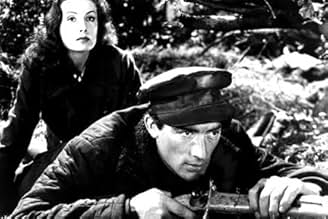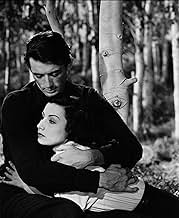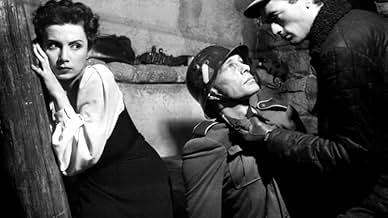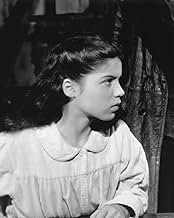IMDb RATING
6.1/10
1.5K
YOUR RATING
A heroic guerrilla group fights back against impossible odds during the 1941 German invasion of the Soviet Union.A heroic guerrilla group fights back against impossible odds during the 1941 German invasion of the Soviet Union.A heroic guerrilla group fights back against impossible odds during the 1941 German invasion of the Soviet Union.
- Director
- Writers
- Stars
- Nominated for 1 Oscar
- 3 wins & 1 nomination total
Tamara Toumanova
- Nina
- (as Toumanova)
Glen Vernon
- Mitya
- (as Glenn Vernon)
Edward L. Durst
- Petrov
- (as Edward Durst)
Maria Bibikov
- Vera
- (uncredited)
William Challee
- Ducrenko
- (uncredited)
Gretl Dupont
- Mariya
- (uncredited)
Charles H. Faber
- German Corporal
- (uncredited)
Erford Gage
- Col. Prilenko
- (uncredited)
Peter Helmers
- Von Rundhol
- (uncredited)
Adolf E. Licho
- Anton
- (uncredited)
- Director
- Writers
- All cast & crew
- Production, box office & more at IMDbPro
Featured reviews
Days of Glory was the first relatively big budget film Jacques Tourneur was given opportunity to direct after success of his horror trilogy (Cat People, I walked with the Zombie and Leopard Man).
The particularity of this picture is that it was a debut film for all of it's cast of actors including Gregory Peck who later became one of Hollywood's major stars. Days of Glory is also one of those few openly pro-soviet films that were made in Hollywood during WW-2 when United States and Soviet Union were allies in fighting against Nazi Germany. But this fact doesn't diminish the quality of the film, though some propaganda elements are present in the story, which is about a group of Russian partisans fighting guerilla war against German Nazi troops in occupied Russia.
Overall, Days of Glory is an interesting WW-2 drama with a good story and a cast of interesting characters brought to life by a group of wonderful actors in their first starring role in a film. 7/10
The particularity of this picture is that it was a debut film for all of it's cast of actors including Gregory Peck who later became one of Hollywood's major stars. Days of Glory is also one of those few openly pro-soviet films that were made in Hollywood during WW-2 when United States and Soviet Union were allies in fighting against Nazi Germany. But this fact doesn't diminish the quality of the film, though some propaganda elements are present in the story, which is about a group of Russian partisans fighting guerilla war against German Nazi troops in occupied Russia.
Overall, Days of Glory is an interesting WW-2 drama with a good story and a cast of interesting characters brought to life by a group of wonderful actors in their first starring role in a film. 7/10
Pray silence, workers and peasants, for a "cast of new personalities" headed by the debut of "Mr Gregory Peck, distinguished actor on the New York stage".
A suitably solemn intro for the late Mr P, who supplies a characteristically cigar-store-Indianesque turn as the darkly handsome Russian dam-builder turned train-buster, heading a WW2 band of partisans (i.e., terrorists). His stern Soviet soul is melted only by a sultry ballerina who is stranded with the gang. Other members include a comic peasant double act, a learned Oxonian sidekick and a winsome teen brother and sister, one of whom ends on a Nazi noose (the wrong one, given the girl's saccharine performance).
This retrospectively hilarious and morally objectionable whitewashing of the most murderous tyranny in history- the communist USSR- fudges its politics like all the Hollywood "enemy of my enemy is my friend" wartime propaganda pieces. "Socialism" as the Peck character's creed is never mentioned. Inspiration for the partisans' efforts is made out to be no more than a worthy resentment of trespassers on their home ground, whether it's a dictatorship or not. (By the same logic Hollywood should now be shooting films justifying Iraqi guerilla resistance to the Americo-British occupation, but don't hold your breath.) The unpalatable truth that many in the western Soviet Union welcomed and collaborated with the Germans has to be evaded. In this flick, solidarity is absolute.
Apart from this hollowness at the core, the film is a decent string of shoot-em-ups in a convincingly icy studio landscape. The stage actors in the cast were and remained unfamiliar, making the thing seem a mite more authentic than, say, "For Whom the Bell Tolls". But Ms Toumanova, the producer's girlfriend at the time, conceives emotional acting as gazing into the remote distance with her lips slightly parted: the influence of Garbo was disastrous! And it would take Selznick and King Vidor to extract a full-blooded performance from Peck, in "Duel in the Sun". It's curious, incidentally, that Casey Robinson, writer and producer of this paean to Stalin, never got serious heat from the House Un-American Activities Committee after the war. Did he cut a deal?
A suitably solemn intro for the late Mr P, who supplies a characteristically cigar-store-Indianesque turn as the darkly handsome Russian dam-builder turned train-buster, heading a WW2 band of partisans (i.e., terrorists). His stern Soviet soul is melted only by a sultry ballerina who is stranded with the gang. Other members include a comic peasant double act, a learned Oxonian sidekick and a winsome teen brother and sister, one of whom ends on a Nazi noose (the wrong one, given the girl's saccharine performance).
This retrospectively hilarious and morally objectionable whitewashing of the most murderous tyranny in history- the communist USSR- fudges its politics like all the Hollywood "enemy of my enemy is my friend" wartime propaganda pieces. "Socialism" as the Peck character's creed is never mentioned. Inspiration for the partisans' efforts is made out to be no more than a worthy resentment of trespassers on their home ground, whether it's a dictatorship or not. (By the same logic Hollywood should now be shooting films justifying Iraqi guerilla resistance to the Americo-British occupation, but don't hold your breath.) The unpalatable truth that many in the western Soviet Union welcomed and collaborated with the Germans has to be evaded. In this flick, solidarity is absolute.
Apart from this hollowness at the core, the film is a decent string of shoot-em-ups in a convincingly icy studio landscape. The stage actors in the cast were and remained unfamiliar, making the thing seem a mite more authentic than, say, "For Whom the Bell Tolls". But Ms Toumanova, the producer's girlfriend at the time, conceives emotional acting as gazing into the remote distance with her lips slightly parted: the influence of Garbo was disastrous! And it would take Selznick and King Vidor to extract a full-blooded performance from Peck, in "Duel in the Sun". It's curious, incidentally, that Casey Robinson, writer and producer of this paean to Stalin, never got serious heat from the House Un-American Activities Committee after the war. Did he cut a deal?
The Russian German war was the greatest battle ever fought and strangely has been ignored by Hollywood. This film, made when the Russians had yet to reach Berlin, was probably a propaganda piece of its time and suffers from some sugary Hollywood treatment. The appearance of a Moscow ballet dancer, and her inevitable love affair with the local guerilla leader, glamourises what was, in reality, a dirty hard war. Whilst we can respect this well-directed movie we can also ask why Hollywood has yet to record its tribute to the amazing determination of the Russian people who were not particularly well led yet overcame such enormous odds. Never mind "Saving Private Ryan" - what about Ivan's story, Mr Spielberg? The Cold War is over, the archives are open, the film is there to be made!
(Some Spoilers) Despite the high hopes and bombastic claims by Adolf Hitler and the German High Command about achieving a swift and total victory in the invasion of the Soviet Union by Hitler's Wehrmacht which racked up spectacular results in the summer and fall of 1941. As cold and freezing weather set in the invading Axis forces started to bog down due to the severe Russian winter and stubborn and fanatical Soviet resistance. By the Red Army on the front lines and the Russian partisan bands behind them.
The Russian partisans were groups of lightly armed but highly motivated and disciplined men and women who ambushed German, and their allies, troops and disrupted the German supply and lines of communications. From the start of the war with the USSR on June 21, 1941 to when the German Army was finally driven out of Russia in the early spring of 1944 Russian partisans inflected over 500,000 casualties on the German army and it's allies. The film "Days of Glory" is about one of these Russian partisan bands, operating out of the swamps marshes and forests around the town of Yasnaya Polyana in Central Russia, led by Soviet Red Army officer Vladimir (Gregory Peck).
Far better then most movies made by Hollywood during WWII "Days of Glory" didn't overdo the Russian heroics as well as the evil and viciousness of the invading Germans. The bravest thing that happened in the movie, in regard to the Russian partisans, was when young Mitya, Glen Veron, was captured by the German Army. When Mitya was about to be executed he had a smile on his face and defiance in his voice, toward his German executioners, as he was hung in the town square.
The Germans for their part were brutal and ruthless to the Russian people that they were in control of. Non the less the Germans weren't as bad as in movies like "The North Star". Where they drained out the blood, like vampires, of the Russian villagers to be used to treat wounded German soldiers, with badly needed blood-transfusions. Or even like in the film "Till We Meet Again" where they, the Germans, raped and inducted Catholic Nuns into brothels to serve and entertain the German Army.
The movie has a very sad and touching love story with Vladimir and the two women who were in love with him Yelena & Nina, Maria Palmer & Tamara Toumanova, and resulted in one of them getting killed by the Germans. Leaving the other feeling guilty, and in a way responsible, about what happened to her. Yelena was a hardened guerrilla fighter who killed over 60 German soldiers during the war. Nina was a sweet sensitive and no-violent young women who was a star dancer in the Russian Bellet before the war began and a Russian guerrilla fighter after it started.
Even though the war action in "Days of Glory" was very sparse when it did come on the screen it was awesome. With a spectacular German ammunition train explosion and a tremendous shoot-out with the attacking German Army, at the very end of the movie. With the Russian Partisans, led by Vladimir and Nina, fighting for their lives with mostly home-made guns and grenades against German tanks planes and artillery pieces. "Days of Glory" did in no way celebrate the brutal Joeseph Stalin regime that ran Russia during WWII as well as before and after the war. In fact I don't remember hearing even once "Comrad Stalin's" name mentioned in the movie.
The film "Days of Glory" was about a people, the Russian people, raising up against an invader and fighting him with everything that they had at their disposal, as meager as it was; in order to drive him, the Germans, out of their homes and land for good and forever.
The Russian partisans were groups of lightly armed but highly motivated and disciplined men and women who ambushed German, and their allies, troops and disrupted the German supply and lines of communications. From the start of the war with the USSR on June 21, 1941 to when the German Army was finally driven out of Russia in the early spring of 1944 Russian partisans inflected over 500,000 casualties on the German army and it's allies. The film "Days of Glory" is about one of these Russian partisan bands, operating out of the swamps marshes and forests around the town of Yasnaya Polyana in Central Russia, led by Soviet Red Army officer Vladimir (Gregory Peck).
Far better then most movies made by Hollywood during WWII "Days of Glory" didn't overdo the Russian heroics as well as the evil and viciousness of the invading Germans. The bravest thing that happened in the movie, in regard to the Russian partisans, was when young Mitya, Glen Veron, was captured by the German Army. When Mitya was about to be executed he had a smile on his face and defiance in his voice, toward his German executioners, as he was hung in the town square.
The Germans for their part were brutal and ruthless to the Russian people that they were in control of. Non the less the Germans weren't as bad as in movies like "The North Star". Where they drained out the blood, like vampires, of the Russian villagers to be used to treat wounded German soldiers, with badly needed blood-transfusions. Or even like in the film "Till We Meet Again" where they, the Germans, raped and inducted Catholic Nuns into brothels to serve and entertain the German Army.
The movie has a very sad and touching love story with Vladimir and the two women who were in love with him Yelena & Nina, Maria Palmer & Tamara Toumanova, and resulted in one of them getting killed by the Germans. Leaving the other feeling guilty, and in a way responsible, about what happened to her. Yelena was a hardened guerrilla fighter who killed over 60 German soldiers during the war. Nina was a sweet sensitive and no-violent young women who was a star dancer in the Russian Bellet before the war began and a Russian guerrilla fighter after it started.
Even though the war action in "Days of Glory" was very sparse when it did come on the screen it was awesome. With a spectacular German ammunition train explosion and a tremendous shoot-out with the attacking German Army, at the very end of the movie. With the Russian Partisans, led by Vladimir and Nina, fighting for their lives with mostly home-made guns and grenades against German tanks planes and artillery pieces. "Days of Glory" did in no way celebrate the brutal Joeseph Stalin regime that ran Russia during WWII as well as before and after the war. In fact I don't remember hearing even once "Comrad Stalin's" name mentioned in the movie.
The film "Days of Glory" was about a people, the Russian people, raising up against an invader and fighting him with everything that they had at their disposal, as meager as it was; in order to drive him, the Germans, out of their homes and land for good and forever.
This tribute to Russian resistance in World War II gave Gregory Peck his opportunity for a starring film screen debut. No walk-ons, or bit parts are in Peck's career resume. He was billed a star from the beginning.
Not that Days of Glory was the greatest of debuts. In fact it was only in his second film, The Keys of the Kingdom for which he got his first Oscar nomination that made him a big star. Still Peck as the stoic and brooding Russian peasant resistance leader certainly had star quality written all over him.
Now that the Cold War is over we can appreciate the Russian contribution to defeating Nazism without getting hung up over Communism. The Russians took a quick study in what defeated Napoleon and applied those lessons to World War II. Where you see the German Army in the Ukraine in Days of Glory is roughly how far they advanced into the Soviet Union. Those partisans that Peck heads are on the cutting edge as factories are being transported and rebuilt in the Urals and east of same and the Red Army is being reorganized. Joe Stalin is also looking a military leadership team to beat the Nazis.
The Russian people took a tremendous toll and it was the great worry of both Roosevelt and Churchill up to the Allied invasion of Normandy that Stalin might just make a separate peace. If he had the world would be very different.
Peck's love interest was dancer Tamara Toumanova who plays a dancer caught up in the partisan movement. As an actress she's a great dancer, she's seen to better advantage in Alfred Hitchcock's Torn Curtain where she concentrates on dancing.
Days of Glory did get an Oscar nomination for Special Effects, but despite that it's essentially an A picture from a B picture studio, RKO. Still it's not a bad last stand story and a decent enough debut for Gregory Peck.
Not that Days of Glory was the greatest of debuts. In fact it was only in his second film, The Keys of the Kingdom for which he got his first Oscar nomination that made him a big star. Still Peck as the stoic and brooding Russian peasant resistance leader certainly had star quality written all over him.
Now that the Cold War is over we can appreciate the Russian contribution to defeating Nazism without getting hung up over Communism. The Russians took a quick study in what defeated Napoleon and applied those lessons to World War II. Where you see the German Army in the Ukraine in Days of Glory is roughly how far they advanced into the Soviet Union. Those partisans that Peck heads are on the cutting edge as factories are being transported and rebuilt in the Urals and east of same and the Red Army is being reorganized. Joe Stalin is also looking a military leadership team to beat the Nazis.
The Russian people took a tremendous toll and it was the great worry of both Roosevelt and Churchill up to the Allied invasion of Normandy that Stalin might just make a separate peace. If he had the world would be very different.
Peck's love interest was dancer Tamara Toumanova who plays a dancer caught up in the partisan movement. As an actress she's a great dancer, she's seen to better advantage in Alfred Hitchcock's Torn Curtain where she concentrates on dancing.
Days of Glory did get an Oscar nomination for Special Effects, but despite that it's essentially an A picture from a B picture studio, RKO. Still it's not a bad last stand story and a decent enough debut for Gregory Peck.
Did you know
- TriviaFilm debut of Gregory Peck.
- Crazy creditsOpening credits: Presenting the motion picture debut of a cast of new personalities.
- ConnectionsFeatured in American Masters: A Conversation with Gregory Peck (1999)
- How long is Days of Glory?Powered by Alexa
Details
Box office
- Budget
- $958,000 (estimated)
- Runtime1 hour 26 minutes
- Color
- Aspect ratio
- 1.37 : 1
Contribute to this page
Suggest an edit or add missing content
































